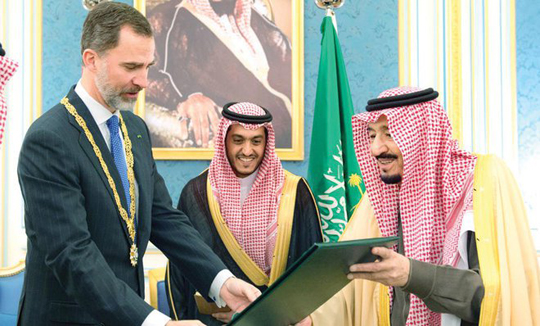Riyadh, Jan 16: The three-day visit to Saudi Arabia by Spain's King Felipe Vl “is a shot in the arm for Saudi-Spanish bilateral trade relations,” said Abdullah Al-Meleihi, a board member of the Council of Saudi Chambers of Commerce and Industry, on Sunday.

Spanish Ambassador Joaquin Perez Villanueva said King Felipe Vl’s visit “is mainly intended to exchange notes on subjects of mutual interest … and drum up support for consolidating economic relations.”
The Spanish king’s delegation comprises a high-level delegation that was expected to meet local business leaders to promote bilateral trade and investment.
“Spain has longstanding … economic relations with the Kingdom, thanks in part to the excellent relationship between former King Juan Carlos and the Saudi royal family,” said Villanueva.
Al-Meleihi, president of Al-Ramez International Group, said: “Saudi Arabia as a country needs know-how, which Spain has in various sectors such as mining, solar energy and construction, among others.”
He added that the visit engenders the transfer of technology, paving the way for Saudi Arabia to eventually export its own finished products to other countries instead of raw materials.
“It would be in stark contrast to the situation some 30 years ago when we were after imports and looking for foreign investors to come to our country for investment purposes,” said Al-Meleihi, whose group is an investor in Euromarche, a major shopping center in the Saudi capital, and in other business ventures.
Dr. Yasser Al-Harbi, a member of the Saudi-Spanish Business Council, said he hoped the meetings would bolster bilateral trade.
“The Saudi and Spanish leaderships have been enjoying a good friendship for a long time now, and we in the private sector in the Kingdom consider Spain a good partner in technology and knowledge transfer,” said Al-Harbi, who is also vice chairman of the Aparal Group, which is involved in information and communications technology (ICT) in the Kingdom.
Saudi Arabia is Spain’s third-largest trade partner in the Arab world, and is ranked 12th among exporting countries to Spain from outside the EU.
The two countries are near to finalizing a $2.1 billion deal that will see Spain sell five warships to Saudi Arabia.
Spain is also involved in the $22.5 billion Riyadh Metro project, also called the King Abdulaziz Project for Riyadh Public Transport. The Spanish construction group FCC leads the FAST consortium in the ongoing project.
The Metro system will meet the demand of the city’s growing population while reducing congestion in the city. The population in Riyadh by 2030 is expected to reach 8 million.
The FCC said Riyadh Metro is the largest international contract in the history of construction in which a Spanish company has been awarded a contract. The contract covers the design and construction of three lines totaling 64.6 km.
Spain is also involved in building a high-speed rail line between Makkah and Madinah. Major Spanish companies such as Talgo, OHL, Adif and RENFE formed a consortium and won the railway project in 2011.





Comments
Add new comment